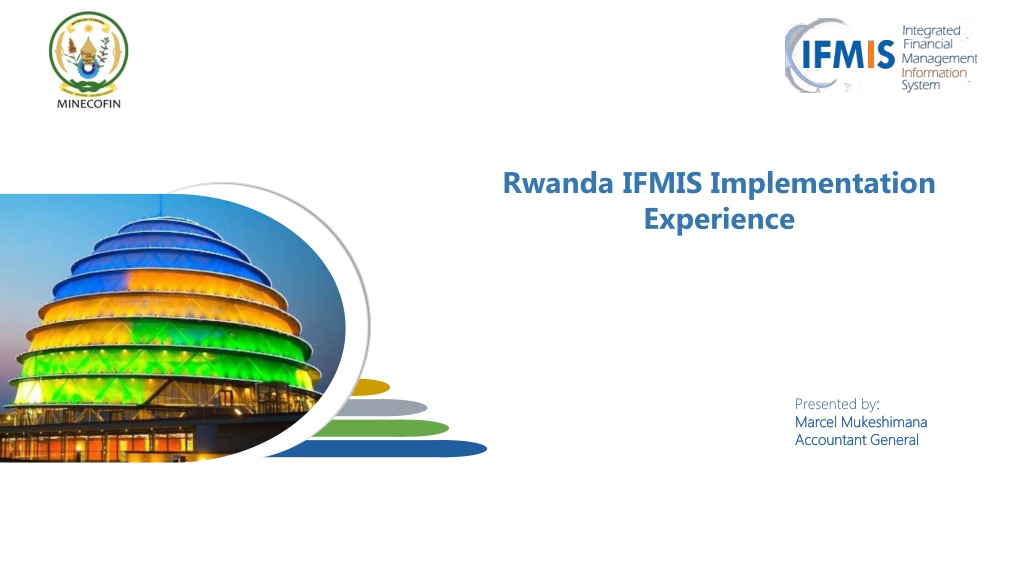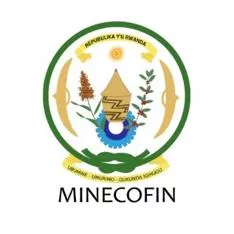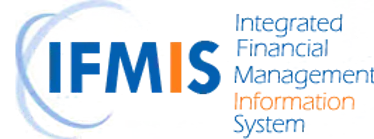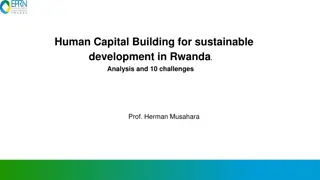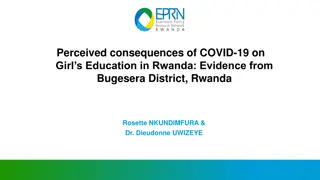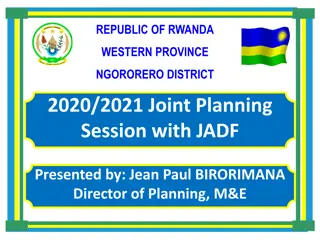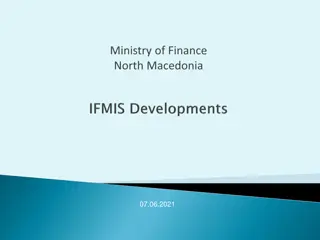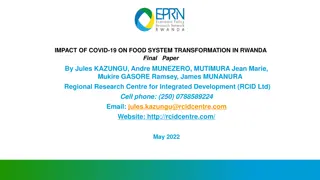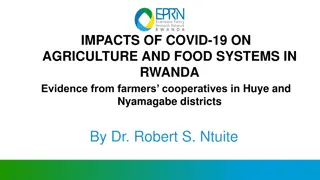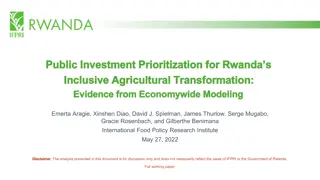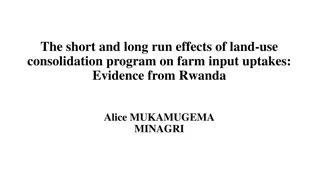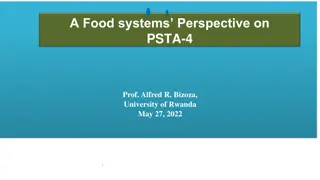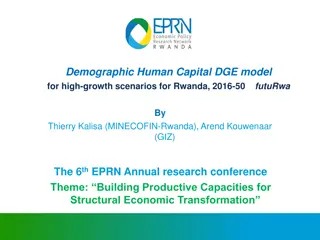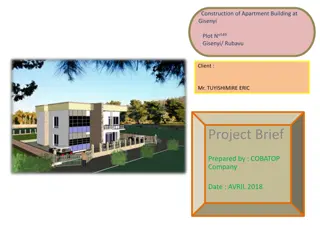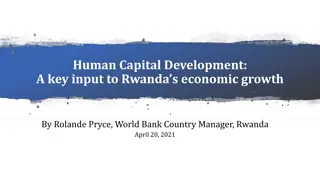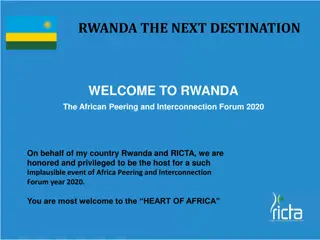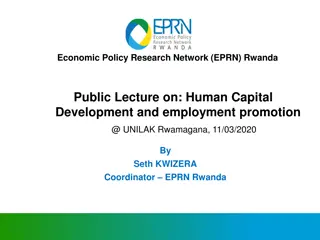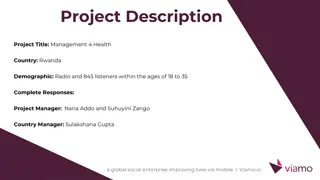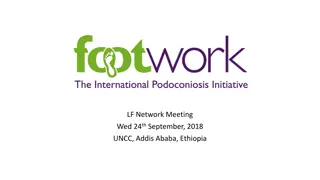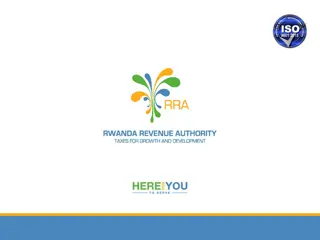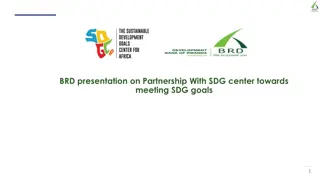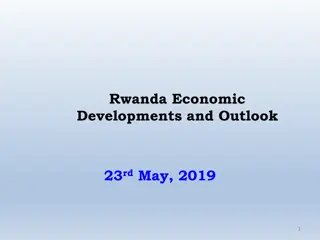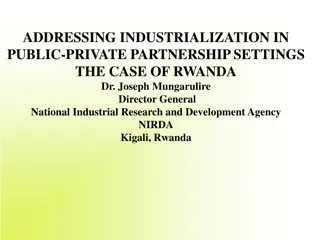Rwanda IFMIS Implementation Experience
Rwanda's IFMIS Implementation Experience, presented by Marcel Mukeshimana, the Accountant General, showcases the transformative impact of e-Governance and the current PFM e-Service Delivery Ecosystem. IFMIS plays a central role in streamlining government operations, enhancing transparency, and improving service delivery to citizens, businesses, and employees. The integration of technology has facilitated G2G, G2C, G2E, and G2B interactions, resulting in increased efficiency, accountability, and citizen engagement.
Download Presentation

Please find below an Image/Link to download the presentation.
The content on the website is provided AS IS for your information and personal use only. It may not be sold, licensed, or shared on other websites without obtaining consent from the author. Download presentation by click this link. If you encounter any issues during the download, it is possible that the publisher has removed the file from their server.
E N D
Presentation Transcript
Rwanda IFMIS Implementation Experience Presented by: : Marcel Mukeshimana Marcel Mukeshimana Accountant General Accountant General
Agenda Agenda 1 1 E-Governance: Public Sector Services Automation 2 2 Current PFM e-Service Delivery Ecosystem IFMIS: The Core of PFM Automation 3 3 Key values delivered by PFM Systems 4 4 IFMIS Systems toward vision 2050 Challenges and Risk mitigation strategies 5 5 1 1
E-Governance: Public Sector Automation When we use the term e-Governance, we mean the use of information and communication technologies (ICT) to promote more efficient and effective government, facilitate more accessible government services, allow greater public access to information and make government more accountable to citizens. E-Governance involve delivering services via the Internet, telephone, community centers (self- service or facilitated by others), wireless devices or other communications systems. E-governance is the digital transformation in the delivery of services between government institutions or agencies (G2G), citizens (G2C), employees (G2E) and businesses (G2B). Digital service delivery reduces inefficiencies in public service delivery, increases accountability and reduces corruption through transparency, and empowers the citizen or business through access to information and services they need anywhere, anytime, resulting in e-governance. This in turn boosts public satisfaction and engagement with the government and is directly correlated with the principles of good governance. Thus, e-governance is an enabler of good governance. E-Governance Government to Government to Citizens Citizens Government to Government to Employees Employees 12,385 Users Government to Government to Government Government Government to Government to Business Business PFM Systems E-Governance 4 4
Current PFM e-Service Delivery Ecosystem Government Government to Government to Government (G2G) Planning, Budgeting, Accounting, Treasury Management and Financial Reporting made simple and easier using IFMIS and SDMS web-based systems (G2G) Government to Employee (G2E) Government to Employee (G2E) Time to pay employee reduced to a great extent through the integration of IFMIS, SmartHR and Banks Recruitment of employees made easier using e-recruitment of IPPIS Government to Business (G2B) Government to Business (G2B) Bidding and contracting online via Umucyo and PKI Supplier registration and tax declaration made easier 12,385 Users Government to Citizens (G2C) Government to Citizens (G2C) Local government services, RNP services, Migration services, etc availed online using MNOs, Banks, Irembo, e-Tax, etc. National exam registration facilitated via SDMS, Irembo and Banks 5 5
IFMIS: IFMIS: Design of a Typical From books From books Financial management information systems (FMIS) can be broadly defined as a set of Financial management information systems (FMIS) can be broadly defined as a set of automation solutions that enable governments to plan, execute, and monitor the budget automation solutions that enable governments to plan, execute, and monitor the budget by assisting in the prioritization, execution, and reporting of expenditures, as well as the by assisting in the prioritization, execution, and reporting of expenditures, as well as the custodianship and reporting of revenues. custodianship and reporting of revenues. 2 2
IFMIS Rwanda: IFMIS Rwanda: Development Dimensions Development Dimensions Institutional Coverage Institutional Coverage System System Administratio Administratio n n Users Users: Officers to Executives Institutions Institutions: Ministries to Service Delivery Units Planning Planning E E- -procurement procurement Functional Coverage Functional Coverage E E- -Banking Banking (National Bank) (National Bank) Reports Reports Budgeting Budgeting PFM Processes: PFM Processes: Planning, Budget, Payments, Receivable, Accounting, Assets, Reporting, Interfacing, Business Intelligence, etc. Technology Technology Commercial Commercial Banks Banks Assets & Assets & Inventory Inventory Payment Payment E E- -Tax Tax Accounting Accounting Receipts Receipts Technology: Technology: Infrastructure and Connectivity; Software and Applications; Development, Deployment and Operations. Payroll System Payroll System Software System = Users + Applications + Hardware Software System = Users + Applications + Hardware 6 6
IFMIS: Current Institutional Coverage of PFM Systems 172 BAs Public Sector Public Sector 6,566 Sites Central Central Government Government Local Local Government Government Central Treasury (1 1) Ministries and Agencies (172 Development Projects (76 Embassies and High Commissions (39 Judicial Entities (41 41) Kigali city (1 1) Districts (30 Districts Hospitals (43 Sectors (416 Health centers (502 Public Schools (4,873 30): 172) 76) 43) 16,151 Users 416) 39) 502) 4,873) >20,144 Suppliers 7 7
Key Values Realized via PFM Systems Transparent Transparent procurement with procurement with internationalized internationalized bidding rather than bidding rather than localized one localized one Budget preparation and Budget preparation and execution with focus on execution with focus on Value, Collaboration, Value, Collaboration, Control, Accountability Control, Accountability and Transparency and Transparency Efficient revenue using Efficient revenue using cashless options, with cashless options, with real real- -time reconciliation time reconciliation and accounting. and accounting. Accountants are Accountants are becoming financial becoming financial analysts rather than analysts rather than transaction entry clerks transaction entry clerks 1 1 2 2 3 3 4 4 5 5 6 6 7 7 Cashless payment Cashless payment eliminated teller at eliminated teller at BNR and with timely BNR and with timely payment to payment to employees, suppliers employees, suppliers and other beneficiaries and other beneficiaries Paperless, cashless, Paperless, cashless, efficient, and efficient, and transparent Treasury transparent Treasury management management Time and cost saving Time and cost saving using paperless using paperless financial reporting and financial reporting and consolidation tool consolidation tool 8 8
IFMIS Systems Evolution Functional expansion to all decentralized service delivery units. Machine learning, Data Mining, Blockchain, Artificial Intelligence and other state of art technologies to be art the heart of improving service delivery, transparency and accountability in PFM systems. Paperless and cashless policies will continue to drive the digitization of PFM services across all government service delivery units, with aim of self-service, any time, any where. 9 9
Automation Challenges Institution Challenges Institution Challenges Human Challenges Human Challenges IFMIS Functional Expansion IFMIS Functional Expansion Business Experts vs Computer Programmers: Language differences Lack of official guidelines, policies and procedures for institutions or departments that need business process automation. Automation skills gap: The illusion of explanatory depth (IOED) is a cognitive bias where people believe that they understand a topic much better than they actually do. Automation Cost vs ROI Ownership and coordination between institutions: Education vs Finance (SDMS as one systems owned by two ministries), Health vs Finance (?), Infrastructure vs Finance (?) External dependencies that may not allow to move to the required speed. Cybersecurity 10 10
Risk mitigation strategies IFMIS & SDMS IFMIS & SDMS IFMIS Functional Expansion IFMIS Functional Expansion Rwanda s progress is grounded in favorable transformational factors in the form of its visionary leadership as well as the results-based culture, home grown solutions, security, stability, law and order, and zero tolerance to corruption among others. PFM systems are founded on top of this political will. Agility Software Development as the primary PFM Systems development methodology in order to cope with government dynamism and high technological changes. The ability to adapt IFMIS to new changes The ability to adapt IFMIS to new changes is the key success factor. is the key success factor. IFMIS systems being developed in line within e- Government wide framework, strategies and policies. 4 4
Lessons Learned In In- -house Development house Development In In- -house Development house Development IFMIS Functional Expansion IFMIS Functional Expansion Use a domain-driven design approach to designing IFMIS. Political will is the core factor to having in-house system. In-house IFMIS is always cheaper than off-the-shelf IFMIS In-house software development promote country s internal capacity for self-development and sustainability. Favor IFMIS process-based automation as opposed to data-entry tool. Believe always in the capacity of internal resources. Collaboration is key to achieving successful development of IFMIS. 10 10
THANK YOU VISIT RWANDA For detailed information or for any question on the presentation, please contact: marcel.mukeshimana@minecofin.gov.rw
